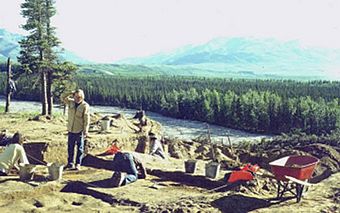Dry Creek Archeological Site facts for kids
|
Dry Creek Archeological Site
|
|

Archaeologists at work at Dry Creek
|
|
| Lua error in Module:Location_map at line 420: attempt to index field 'wikibase' (a nil value). | |
| Location | Address restricted , Denali Borough, Alaska, USA |
|---|---|
| Nearest city | Healy, Alaska |
| NRHP reference No. | 74000442 |
Quick facts for kids Significant dates |
|
| Added to NRHP | September 6, 1974 |
| Designated NHL | June 2, 1978 |
The Dry Creek Archeological Site is a very important place in Alaska. It is an archaeological site located near Denali National Park and Preserve. This site shows us how people lived a very long time ago. Scientists have found proof of humans living here as far back as 11,000 years ago.
The site is on the northern side of the Alaska Range. It is close to Healy, Alaska, near the Nenana River.
Contents
What Makes Dry Creek Special?
The Dry Creek site is special because it has many layers. These layers are like pages in a history book. Each layer shows a different time period. Wind-blown dust, called loess, separates these layers. This helps archaeologists understand the different times.
Layers of History
There are four main layers at the site. Each layer tells us about different groups of people.
- The newest layer is from about 2,600 to 1,400 years ago. This layer is one of the few places in inland Alaska where special "notched" stone tools have been found.
- The two oldest layers are from about 8,500 to 9,000 years ago. These layers contain tiny stone blades. These blades were used as tools.
- The very bottom layer had over 3,500 artifacts. Most of these were small pieces of stone. These pieces were left over from making tools.
- One cool find was a stone scraping tool. It had a triangular head. It was about 31 by 16 millimeters in size.
Tools and Animals from the Past
Archaeologists have found many types of stone tools here. They also found remains of different animals. This shows that people hunted and processed many kinds of animals. The site helps us learn about a key time in history. This was right after the last Ice Age ended.
Discovering the Site
The Dry Creek site was first found in 1973. A person named C. E. Holmes discovered it. Big excavations, or digs, happened in the late 1970s. More research was done in the 1990s.
Protecting This Important Place
Because of its importance, the site is protected. It was added to the National Register of Historic Places in 1974. This list helps protect special places in the United States. In 1978, it was named a National Historic Landmark. This means it is a place of national importance.
 | Mary Eliza Mahoney |
 | Susie King Taylor |
 | Ida Gray |
 | Eliza Ann Grier |

